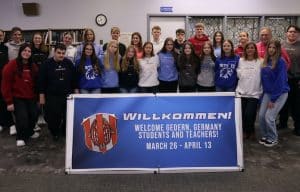Col. Morrison’s 200th

Most Waterloo residents are no doubt familiar with Col. William R. Morrison given his legacy as half of the local library’s namesake.
With Morrison-Talbott Library having celebrated his 200th birthday over the weekend, it is worth painting a picture of this prominent local figure for those who happen to exclusively know his name.
Morrison was born Sept. 14, 1824. Per a marker at the Col. Morrison House on Park Street, he was raised on a farm – though his father’s remarriage resulted in him later growing up in town.
His father operated Ditch Tavern, which was a particularly busy political hub for the region. This likely contributed to Morrison’s political interest at a young age, as he is reported to have said that he always visited polls on election day starting when he was 7 or 8.
According to a Sept. 4, 2003 article in the Republic-Times, Morrison spent two years at McKendree College before enlisting and serving as a private in the Second Illinois Infantry during the Mexican-American War.
With the close of the war, Morrison took up farming but found it couldn’t keep his attention.
In 1849, he and three fellows from Louisiana headed west to see if they could strike it rich during the Gold Rush, and with over $10,000 in profits found, it would seem he was rather successful.
Morrison returned to McKendree upon his return to Illinois – though not before going on a considerable adventure.
Following his participation in the Gold Rush, he took a boat to Panama and traveled across the country by mule and on foot, then sailing to Cuba, New Orleans and St. Louis before settling back in Waterloo.
With his return, Morrison married his first wife, Mary “Jane” Drury in December 1851. The marriage would prove short with her death in 1856, and he was additionally left with no children as both died in infancy.
He served as clerk of the Monroe County Circuit Court from 1852-54. As he studied law, he was admitted to the bar in 1855 and thus began practicing in Waterloo.
Also in 1854, Morrison began service in the Illinois House of Representatives, serving from 1854-60 and then in 1870 and 1871, additionally serving as speaker in 1859 and 1860.
The considerable break in his legislative service was due to his involvement in the American Civil War, where he organized and served as colonel of the 49th Illinois Regiment.
The regiment is known for its role in the Union’s capture of Fort Donelson. Though Morrison was shot in the hip while serving as brigade commander during the siege and returned home to recover, he returned to the front amid the conflict at Pittsburgh Landing.
During his service, Morrison was nominated and elected into the 38th Congress, thought it seems to have taken intervention from President Lincoln to have his resignation accepted.
He served in Congress from 1863-65 and later in 1873-87. He served as chairman of the U.S. House Committee on Ways and Means and did not always follow the lead of the Democratic caucus. As head of Ways and Means, Morrison worked hard for tariff reform, without much success. His bill met with so much Democratic obstruction that it never reached a final vote.
Morrison was also appointed as a member of the Interstate Commerce Commission from 1887-97 thanks to President Cleveland.
From 1876-96, he was considered to have the potential to run for president, though his retirement from the Interstate Commerce Commission saw him simply returning to his law practice in Waterloo.
Back in 1857, Morrison married Eleanora Horne. She passed away in 1904, though additional early childhood deaths left the couple with no direct descendants.
The historical Col. Morrison Home was built in 1898, and with his passing in 1909, Morrison left the house to the community to be used as a public library, a role which the house held from 1910-1996.
Morrison was interred in Waterloo City Cemetery.






